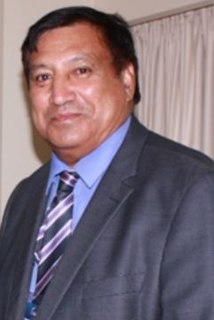
The politics of the Cook Islands, an associated state, takes place in a framework of a parliamentary representative democracy within a constitutional monarchy. The Queen of New Zealand, represented in the Cook Islands by the Queen's Representative, is the Head of State; the prime minister is the head of government and of a multi-party system. The Islands are self-governing in free association with New Zealand and are fully responsible for internal affairs. New Zealand retains some responsibility for external affairs, in consultation with the Cook Islands. In recent years, the Cook Islands have taken on more of its own external affairs; as of 2005, it has diplomatic relations in its own name with eighteen other countries. Executive power is exercised by the government, while legislative power is vested in both the government and the islands' parliament. The judiciary is independent of the executive and the legislatures.
Jim Marurai is a Cook Islands politician and former Prime Minister of the Cook Islands. He is a member of the Democratic Party.

Elections in the Cook Islands gives information on election and election results in the Cook Islands.
The Democratic Party is a liberal political party in the Cook Islands. As a result of the 2018 Cook Islands election, it is currently the largest party in the Cook Islands Parliament.

General elections were held in the Cook Islands on September 27, 2006 in order to elect 24 MPs to the Cook Islands Parliament. The Democratic Party remained in power, winning 15 of 24 seats. A total of 8,497 voters turned out to vote.

General elections were held in the Cook Islands on 7 September 2004. Initial results showed the Democratic Party winning by a wide margin, but close results led to 11 electoral petitions being filed, delaying the date Parliament could sit until mid-December. In the interim, Prime Minister Robert Woonton announced that he was forming a coalition government with the rival Cook Islands Party. This led to a split within the Democrats, with Woonton and four other MPs leaving to form the Demo Tumu Party. With 14 MPs, the coalition had a comfortable majority in Parliament.

General elections were held in the Cook Islands on 16 June 1999 to elect 25 MPs to the Parliament. The Cook Islands Party won 11 seats, the Democratic Alliance Party 10 seats, and the New Alliance Party 4 seats.
Norman George is a Cook Islands politician and former Speaker of the Cook Islands Parliament, Deputy Prime Minister, and Cabinet Minister.

General elections were held in the Cook Islands in January, 1989 to elect 24 MPs to the Parliament. The elections saw the Cook Islands Party win 12 seats, the Democratic Tumu Party win 2 seats, and the Democratic Party-led opposition coalition win 9 seats. One seat was won by an independent. Following the elections, the Democratic Tumu Party supported the CIP, and Geoffrey Henry became Prime Minister for the second time.
Sir Terepai Tuamure Maoate, KBE was Prime Minister of the Cook Islands from 18 November 1999 to 11 February 2002. He was a member of the Cook Islands Democratic Party

General elections were held in the Cook Islands on 17 November 2010 in order to elect 24 MPs to the Cook Islands Parliament. The elections were won by the Cook Islands Party, which won 16 of the 24 seats. Voter turnout was 78%.
Robert George Wigmore was a Cook Islands politician and former Deputy Prime Minister of the Cook Islands and Cabinet Minister. He was leader of the Cook Islands Democratic Party.
Teariki William Heather was Deputy Prime Minister of the Cook Islands from 2013 to 2018. He is a member of the Cook Islands Party.

Sir Tom John Marsters, is the 7th Queen's Representative to the Cook Islands. He is a former Deputy Leader of the Cook Islands Party and Deputy Prime Minister of the Cook Islands.

Henry Tuakeu Puna is the Prime Minister of the Cook Islands. He is leader of the Cook Islands Party and has been Prime Minister since November 2010.
Sir Pupuke Robati, KBE was a Cook Island politician who was the Prime Minister of the Cook Islands from 29 July 1987 to 1 February 1989.
Tekii Lazaro is a Cook Islands politician and Member of the Cook Islands Parliament. He is a member of the Cook Islands Party.

General elections were held in the Cook Islands on 14 June 2018 to elect the 24 members of the 15th Cook Islands Parliament.






